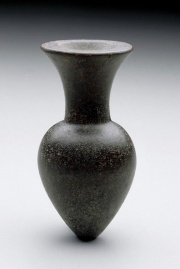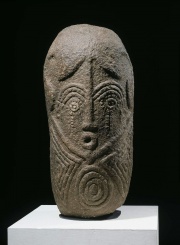Difference between revisions of "Basalt"
| (2 intermediate revisions by 2 users not shown) | |||
| Line 1: | Line 1: | ||
| − | [[File:13.3262-CR6270-d1.jpg|thumb|]] | + | [[File:13.3262-CR6270-d1.jpg|thumb|Egyptian jar<br>MFA# 13.3262]] |
== Description == | == Description == | ||
A hard, dense, often glassy, volcanic rock. Basalts are usually dark gray, black, brown, or greenish-black in color and are primarily composed of [[magnetite]] and fine-grain silicates such as [[plagioclase]], [[olivine]], and [[pyroxene]]. Formed from lava flows, basalts are often found in the form of pillows or columns. Famous natural basalt structures are the Giants Causeway on the northern coast of Ireland, the Needle on St. Helena Island, and Devil's Tower in Wyoming. Black basalts were quarried by ancient Egyptians. These hard stones have been used for building construction and sculptures as well as for small, carved decorative items. Ground basalt is also used to produce glassy, dark-color glazes on pottery. | A hard, dense, often glassy, volcanic rock. Basalts are usually dark gray, black, brown, or greenish-black in color and are primarily composed of [[magnetite]] and fine-grain silicates such as [[plagioclase]], [[olivine]], and [[pyroxene]]. Formed from lava flows, basalts are often found in the form of pillows or columns. Famous natural basalt structures are the Giants Causeway on the northern coast of Ireland, the Needle on St. Helena Island, and Devil's Tower in Wyoming. Black basalts were quarried by ancient Egyptians. These hard stones have been used for building construction and sculptures as well as for small, carved decorative items. Ground basalt is also used to produce glassy, dark-color glazes on pottery. | ||
| − | [[File:1994.419-SC1632.jpg|thumb|]] | + | [[File:1994.419-SC1632.jpg|thumb|Nigerian monolith<br>MFA# 1994.419]] |
| − | |||
== Synonyms and Related Terms == | == Synonyms and Related Terms == | ||
scoria; Basalt (Dan., Deut., Ned., Nor., Sven.); basalto (Esp., It., Port.); basalte (Fr.); bazalt (Pol.); scoriaceous | scoria; Basalt (Dan., Deut., Ned., Nor., Sven.); basalto (Esp., It., Port.); basalte (Fr.); bazalt (Pol.); scoriaceous | ||
| − | == | + | == Physical and Chemical Properties == |
usually contains about 50% silica | usually contains about 50% silica | ||
| Line 20: | Line 19: | ||
|- | |- | ||
! scope="row"| Density | ! scope="row"| Density | ||
| − | | 2.87-3.0 | + | | 2.87-3.0 g/ml |
|} | |} | ||
| Line 31: | Line 30: | ||
</gallery> | </gallery> | ||
| − | + | == Resources and Citations == | |
| − | == | ||
* G.S.Brady, ''Materials Handbook'', McGraw-Hill Book Co., New York, 1971 Comment: p. 86 | * G.S.Brady, ''Materials Handbook'', McGraw-Hill Book Co., New York, 1971 Comment: p. 86 | ||
Latest revision as of 09:36, 2 May 2022
Description
A hard, dense, often glassy, volcanic rock. Basalts are usually dark gray, black, brown, or greenish-black in color and are primarily composed of Magnetite and fine-grain silicates such as Plagioclase, Olivine, and Pyroxene. Formed from lava flows, basalts are often found in the form of pillows or columns. Famous natural basalt structures are the Giants Causeway on the northern coast of Ireland, the Needle on St. Helena Island, and Devil's Tower in Wyoming. Black basalts were quarried by ancient Egyptians. These hard stones have been used for building construction and sculptures as well as for small, carved decorative items. Ground basalt is also used to produce glassy, dark-color glazes on pottery.
Synonyms and Related Terms
scoria; Basalt (Dan., Deut., Ned., Nor., Sven.); basalto (Esp., It., Port.); basalte (Fr.); bazalt (Pol.); scoriaceous
Physical and Chemical Properties
usually contains about 50% silica
| Mohs Hardness | 5-6 |
|---|---|
| Density | 2.87-3.0 g/ml |
Additional Images
Resources and Citations
- G.S.Brady, Materials Handbook, McGraw-Hill Book Co., New York, 1971 Comment: p. 86
- Ralph Mayer, A Dictionary of Art Terms and Techniques, Harper and Row Publishers, New York, 1969 (also 1945 printing)
- Dictionary of Building Preservation, Ward Bucher, ed., John Wiley & Sons, Inc., New York City, 1996
- Luciana and Tiziano Mannoni, Marble: the history of a culture, Facts on File Publications
- Anne Grimmer, Glossary of Building Stone Terms, A Glossary of Historic Masonry Deterioration Problems and Preservation Treatments, National Park Service, Washington DC, 1984
- Van Nostrand's Scientific Encyclopedia, Douglas M. Considine (ed.), Van Nostrand Reinhold, New York, 1976
- Random House, Webster's Encyclopedic Unabridged Dictionary of the English Language, Grammercy Book, New York, 1997
- R.F.Symmes, T.T.Harding, Paul Taylor, Rocks, Fossils and Gems, DK Publishing, Inc., New York City, 1997
- The American Heritage Dictionary or Encarta, via Microsoft Bookshelf 98, Microsoft Corp., 1998
- C.W.Chesterman, K.E.Lowe, Audubon Society Field Guide to North American Rocks and Minerals, Alfred A. Knopf, New York, 1979
- Janet Burnett Grossman, Looking at Greek and Roman Sculpture in Stone, J. Paul Getty Trust, Los Angeles, 2003
- CRC Handbook of Chemistry and Physics, Robert Weast (ed.), CRC Press, Boca Raton, Florida, v. 61, 1980 Comment: density=2.4-3.1
- George Savage, Art and Antique Restorer's Handbook, Rockliff Publishing Corp, London, 1954




